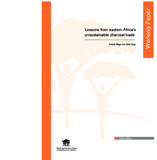Lessons from eastern Africa’s unsustainable charcoal business

View/
Date
2006Author
Mugo, Fridah
Ong, Chin
Type
Working PaperLanguage
enMetadata
Show full item recordAbstract
Although charcoal meets 80% of urban households’ energy needs in eastern Africa, it
hardly attracts the attention of policy makers. Yet charcoal will remain the main cooking
fuel for most people in the region’s towns for the foreseeable future because it is
affordable. As demand for charcoal increases with rapid urbanisation, so does pressure on
forests and woodlands, most of which are poorly managed and prone to degradation.
Matters are made worse because there are no incentives for investment in planned
charcoal production. Consequently, the current charcoal business is unsustainable and has
a negative image. Banning the making and transportation of charcoal in some countries
has largely been unsuccessful in regulating its production and trade. There is need to look
for alternative ways of dealing with charcoal issues.
Over the past few years, the Regional Land Management Unit (RELMA) has conducted a
series of workshops to discuss charcoal trade in the region. From the discussions, it was
clear that contradictory directives and weak laws are to blame for the confusion in the
charcoal business in eastern Africa. Apart from Sudan and Kenya, the other countries are
yet to formulate policies or enact laws to promote sustainable charcoal production and
use.
While Sudan has a regulatory system of planting and harvesting trees for charcoal
production, the other countries neither plant trees nor give land owners incentives to do
so. Instead, they are preoccupied with policing exploitation of existing stocks of wood.
Other obstacles to streamlining charcoal trade include inefficient production methods,
poor marketing and its semi-illegal status. What must be done? It is vital to create the
right climate for profitable and sustainable charcoal production. This can be done by
formulating sound policies and enacting appropriate laws. Regulation of charcoal
production, distribution and marketing should be assigned to a single authority that would
be accountable for all issues relating to the industry. Finally, there should be short- and
long-term plans for tree planting by smallholders and the private sector. With the right
climate, charcoal trade can be turned round to provide employment and protect the
environment it now threatens.
